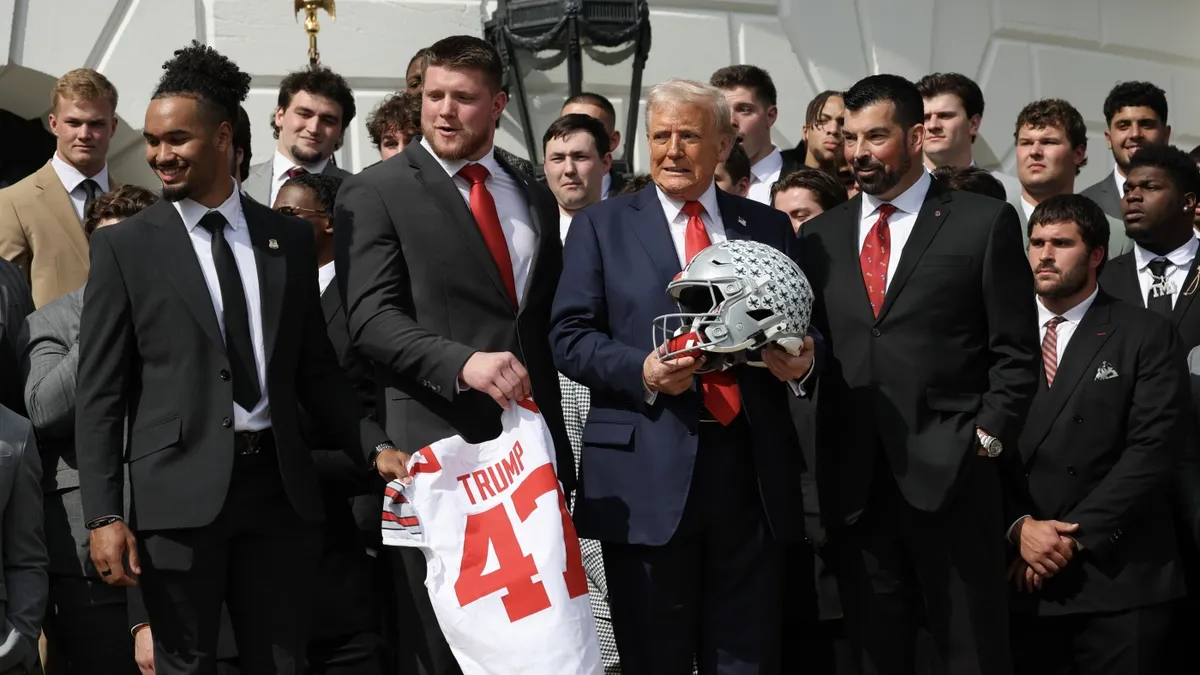
In a bold move, President Trump signed a new executive order on Thursday that targets the landscape of college sports. This order aims to empower federal agencies, particularly the U.S. Department of Education, which oversees funding for public universities, to enforce new regulations regarding athletic scholarships and pay-for-play licensing deals for student-athletes. The directive emphasizes the importance of maintaining scholarship opportunities for women's and Olympic sports amidst the evolving landscape of athlete compensation.
The executive order mandates that the nation’s largest athletic departments uphold a certain number of scholarships for women's and Olympic sports. This provision seeks to address the alarming changes in college sports, warning of an unprecedented threat to the future of these essential programs. The order states that a national solution is critically needed to prevent the deterioration of non-revenue sports, which are vital not only for the integrity of intercollegiate athletics but also for the success of American athletes in international competitions.
One of the significant aspects of the order is its focus on the burgeoning name, image, and likeness (NIL) deals that have transformed the financial landscape for college athletes in recent years. The order expresses concern over the potential imbalance created by these lucrative contracts, which allow athletes, particularly in football and basketball, to earn substantial incomes. Legal experts have raised questions about whether the provisions in the executive order will hold up in court, but it clearly signals an increasing federal interest in the realm of college athletics.
This executive order follows the recent approval of a House settlement that permits Division I college athletic departments to compensate players directly, challenging the longstanding NCAA tradition of amateurism. With schools now able to pay athletes up to an initial cap of $20.5 million, concerns have arisen regarding the future of non-revenue sports, such as many women's and Olympic sports, as resources may be reallocated to support higher-earning athletes.
To mitigate these concerns, the executive order proposes several "guardrails." It requires high-earning college athletic departments to provide a greater number of scholarship opportunities for non-revenue sports compared to the 2024-2025 school year. This requirement is expected to affect around 30 of the largest athletic programs in the country. The order also directs the Department of Education to leverage federal funding disbursement, Title IX enforcement, and interstate commerce laws to influence these institutions.
The directive suggests a significant shift in federal involvement in college sports, raising questions about the potential consequences of such actions. Experts, including Sam Ehrlich from Boise State University, have expressed skepticism about whether this initiative will lead to meaningful change or if it is merely a threat without substantial follow-through.
The executive order specifically targets pay-for-play arrangements tied to NIL rights, stating that universities should not allow improper deals that effectively serve as compensation for playing. Instead, the order calls for fair market value arrangements for brand endorsements and legitimate purposes. This stance aligns with the NCAA's longstanding efforts to redefine eligibility and compensation structures in response to ongoing litigation.
The NCAA has welcomed the executive order, emphasizing the need for federal support to navigate the complexities of college sports, which affect millions of student-athletes. NCAA President Charlie Baker highlighted the organization's commitment to enhancing college sports in collaboration with Congress and the Trump administration.
Despite the potential benefits of the executive order, some analysts warn that it could deepen partisan divides in college sports rather than foster the consensus needed for long-term reform. With the Republican majority in the Senate falling short of the necessary votes to pass new legislation, the path ahead remains uncertain.
In addition to the provisions aimed at athletic departments, the order directs multiple federal agencies, including the National Labor Relations Board, to clarify the legal status of collegiate athletes, ensuring they remain classified as non-employees under labor law. The Justice Department and Federal Trade Commission are also tasked with preparing for potential future litigation in the evolving landscape of college sports.